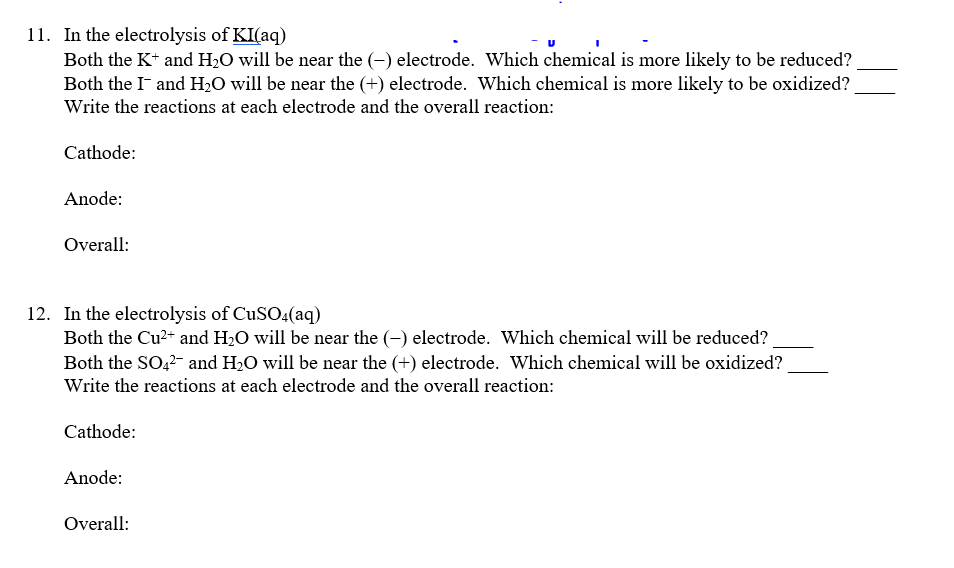11. In the electrolysis of KI(aq) Both the K* and H2O will be near the (-) electrode. Which chemical is more likely to be reduced? Both the I- and HzO will be near the (+) electrode. Which chemical is more likely to be oxidized? Write the reactions at each electrode and the overall reaction: Cathode: Anode: Overall:
11. In the electrolysis of KI(aq) Both the K* and H2O will be near the (-) electrode. Which chemical is more likely to be reduced? Both the I- and HzO will be near the (+) electrode. Which chemical is more likely to be oxidized? Write the reactions at each electrode and the overall reaction: Cathode: Anode: Overall:
Living By Chemistry: First Edition Textbook
1st Edition
ISBN:9781559539418
Author:Angelica Stacy
Publisher:Angelica Stacy
ChapterU5: Fire: Energy , Thermodynamics, And Oxidation-reduction
Section: Chapter Questions
Problem SIV5RE
Related questions
Question

Transcribed Image Text:11. In the electrolysis of KI(aq)
Both the K* and H2O will be near the (-) electrode. Which chemical is more likely to be reduced?
Both the I and H,O will be near the (+) electrode. Which chemical is more likely to be oxidized?
Write the reactions at each electrode and the overall reaction:
Cathode:
Anode:
Overall:
12. In the electrolysis of CuSO4(aq)
Both the Cu2+ and H2O will be near the (-) electrode. Which chemical will be reduced?
Both the SO,2- and H2O will be near the (+) electrode. Which chemical will be oxidized?
Write the reactions at each electrode and the overall reaction:
Cathode:
Anode:
Overall:
||
Expert Solution
This question has been solved!
Explore an expertly crafted, step-by-step solution for a thorough understanding of key concepts.
This is a popular solution!
Trending now
This is a popular solution!
Step by step
Solved in 2 steps with 1 images

Knowledge Booster
Learn more about
Need a deep-dive on the concept behind this application? Look no further. Learn more about this topic, chemistry and related others by exploring similar questions and additional content below.Recommended textbooks for you

Living By Chemistry: First Edition Textbook
Chemistry
ISBN:
9781559539418
Author:
Angelica Stacy
Publisher:
MAC HIGHER

Chemistry & Chemical Reactivity
Chemistry
ISBN:
9781133949640
Author:
John C. Kotz, Paul M. Treichel, John Townsend, David Treichel
Publisher:
Cengage Learning

Chemistry & Chemical Reactivity
Chemistry
ISBN:
9781337399074
Author:
John C. Kotz, Paul M. Treichel, John Townsend, David Treichel
Publisher:
Cengage Learning

Living By Chemistry: First Edition Textbook
Chemistry
ISBN:
9781559539418
Author:
Angelica Stacy
Publisher:
MAC HIGHER

Chemistry & Chemical Reactivity
Chemistry
ISBN:
9781133949640
Author:
John C. Kotz, Paul M. Treichel, John Townsend, David Treichel
Publisher:
Cengage Learning

Chemistry & Chemical Reactivity
Chemistry
ISBN:
9781337399074
Author:
John C. Kotz, Paul M. Treichel, John Townsend, David Treichel
Publisher:
Cengage Learning

Principles of Modern Chemistry
Chemistry
ISBN:
9781305079113
Author:
David W. Oxtoby, H. Pat Gillis, Laurie J. Butler
Publisher:
Cengage Learning

General Chemistry - Standalone book (MindTap Cour…
Chemistry
ISBN:
9781305580343
Author:
Steven D. Gammon, Ebbing, Darrell Ebbing, Steven D., Darrell; Gammon, Darrell Ebbing; Steven D. Gammon, Darrell D.; Gammon, Ebbing; Steven D. Gammon; Darrell
Publisher:
Cengage Learning
